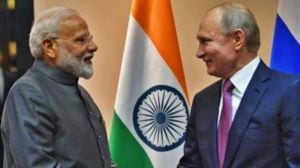Sber’s Alexander Vedyakhin on 15 Years in India: Building Bridges from Business to Culture
Over the course of fifteen years in India, Sber has grown from a small office to a full-fledged bank with customer centers in Delhi and Mumbai and its own IT hub in Bangalore.
 Alexander Vedyakhin, First Deputy Chairman of Sberbank
Alexander Vedyakhin, First Deputy Chairman of SberbankThe Eastern Economic Forum (EEF), which began in Russia on September 3, featured insights from Alexander Vedyakhin, First Deputy Chairman of Sberbank. He discussed the bank’s pivotal role in Russia-India relations as it marks 15 years in India, talking about initiatives to strengthen the strategic partnership and new opportunities for mutually beneficial cooperation.
- Sberbank is celebrating 15 years of operation in India this year. How would you describe your mission today, and what role do you see the bank playing in the development of Russian-Indian relations?
Over the course of fifteen years in India, Sber has grown from a small office to a full-fledged bank with customer centers in Delhi and Mumbai and its own IT hub in Bangalore.
During this time, we have accumulated significant expertise in supporting companies that develop cooperation between Russia and India. Today, our key task is to help businesses in both countries find partners and build sustainable relationships with them. We strive to make processes as transparent and fast as possible—this is what forms the basis for further growth of the bilateral economy.
Sberbank’s uniqueness lies in the fact that we are both an independent Indian bank and part of Russia’s largest financial institution. This combination gives clients access to local expertise while allowing them to take advantage of the vast capabilities of the entire Sberbank ecosystem. This enables us to offer solutions not only for everyday payments, but also for more complex tasks related to infrastructure development and the intensification of trade between our countries.
- Trade turnover between Russia and India has grown exponentially in recent years, and the goal is to reach $100 billion by 2030. What steps do you think are necessary to make this goal a reality?
The potential for Russian-Indian trade remains very high: annual growth could be around 10%, and we are confident that a multiple increase in turnover is possible regardless of the political situation. To achieve this goal, it is important to remove the barriers that are currently holding back development. One of these is the trade imbalance: domestic exports to India exceed $70 billion, while imports from India remain at around $5 billion. This is largely due to the structure of supplies, with Russian energy resources accounting for around 85%.
The situation can be balanced by expanding imports of other goods and bringing new players to the market. This includes not only large corporations, but also thousands of small and medium-sized enterprises in areas such as pharmaceuticals, electronics, mechanical engineering, and metallurgy. The transition from a “resources in exchange for goods” model to the development of new industries and joint creation of technologies will form the basis of the future economy in Russian-Indian relations.
- The entry of thousands of new companies into the Russian-Indian market will require not only access to international financial instruments, but also business expertise. What role does Sberbank play in this process and what initiatives are you implementing to help businesses successfully enter new markets?
We understand that companies in the international market need not only financial support, but also practical assistance in finding suppliers and selecting business tools. That is why we are developing the Business Development project, for example. Its teams work in both Russia and India and help companies quickly find reliable partners. This approach reduces risks, speeds up transactions, and makes the entry of new players into the market more successful.
Enormous opportunities are opening up for our countries, and with competent organization, they can become as profitable as possible for both sides. One of the most important conditions is the training of new business leaders who can become the driving force behind this process. That is why, together with one of Russia’s leading universities, we are launching the Russia Executive Business Program. The first cohort will start in November, and its participants will be Indian entrepreneurs interested in developing projects with Russia.
- The growth in trade is accompanied by increasingly close contacts between people, from students to tourists. Earlier, you noted a multiple increase in transfers from Russia to India. What solutions for private clients are most in demand today, and how do they help strengthen ties between the two countries?
We pay a lot of attention to private clients because it is through them that strong ties between our countries are formed. Those who come to work in Russia from India can conveniently transfer funds to India via the Sberbank Online mobile app. Today, the monthly volume of such transactions exceeds 1 billion rubles. A separate area is student support. We recently launched a service for paying for tuition at Russian universities, and interest in it is growing rapidly—by more than 150% per week. This shows how much demand there is for such solutions. The next step is tourism. Already this season, we are launching a cashless payment service for Russians planning trips to India. We expect it to provide additional comfort to thousands of travelers and make travel between our countries even easier.
All of these services — money transfer, education, tourism — are directly related to people’s everyday needs. It is these services that transform economic cooperation into living human contacts, which in turn build long-term trust.
- How can a bank participate in the process of forming “human contacts” more broadly—beyond financial and business services?
Sberbank occupies a special place in Russia’s financial system, and we have a serious responsibility. We are actively involved in international trade and understand that our role is not limited to conducting settlements. It is important to create a space for cooperation that is comfortable for both businesses and people.
That is why we are developing projects that strengthen cultural ties between our countries: we stimulate interest in each other and involve people in learning about traditions and modern life. This work takes many different forms. For example, we turned to the legacy of Nicholas Roerich, a great Russian artist, philosopher, and traveler for whom India became a spiritual home: the Kandinsky neural network created digital works in his style, showing how technology can reinterpret our common heritage. And in December, with the support of Sberbank, Boris Eifman’s theater will tour Mumbai with a production of Anna Karenina. I am confident that this event will be another step towards bringing our countries closer together, because culture and trust always underpin economic and financial ties.
Disclaimer
This content is sponsored and does not reflect the views or opinions of IE Online Media Services Pvt Ltd. No journalist is involved in creating sponsored material and it does not imply any endorsement whatsoever by the editorial team. IE Online Media Services takes no responsibility for the content that appears in sponsored articles and the consequences thereof, directly, indirectly or in any manner. Viewer discretion is advised.
- 01
- 02
- 03
- 04
- 05































